#major ports in India
Explore tagged Tumblr posts
Text
Discover the importance of India's major ports that drive its international trade. Learn about key export and import hubs like Mumbai, JNPT, and Mundra, and how these ports are essential to India's growing economy and global commerce. Explore India's largest and busiest seaports today!
#major ports in India#ports in India#India sea ports#largest ports in India#major export ports in india#export ports in india#import ports in india#Mumbai port import and export#Visakhapatnam port import and export
0 notes
Text

Explore the major import and export ports in India and their vital role in the nation's economy. Learn about India's biggest export and import seaports, including Mumbai, Mundra, Visakhapatnam, and more. Discover key facts about India's maritime trade and how these ports contribute to international commerce.
#major ports in India#ports in India#India sea ports#largest ports in India#imports and exports of India
0 notes
Text
Discover Eximpedia's comprehensive list detailing the list 13 major ports and largest sea ports in India. Gain valuable insights into the country's maritime infrastructure, facilitating trade and commerce on a significant scale. Explore India's major ports with Eximpedia.
#Major Ports in India#Largest Ports in India#India’s major ports#India’s largest ports#List of Major Ports in India#India Sea ports#Largest Sea port in India
0 notes
Text
Top 10 major ports of India
Click here to explore in details...
#Top 10 major ports of india#Indian shipping ports#Top shipping ports of India#sea ports#Merchant ports of india
0 notes
Text

Effective Immediately. The Water Transport Workers Federation of India representing workers at 11 major Indian ports will refuse to load or unload weapons to Israel. This is in solidarity with a call by Palestinian trade unions. India sends $7bn in arms to Israel a year
422 notes
·
View notes
Text

Cartagena de Indias, Colombia: Cartagena known since the colonial era as Cartagena de Indias is a city and one of the major ports on the northern coast of Colombia in the Caribbean Coast Region, along the Caribbean sea. Cartagena's past role as a link in the route to the West Indies provides it with important historical value for world exploration and preservation of heritage from the great commercial maritime routes. Wikipedia
147 notes
·
View notes
Text

The Water Transport Workers union in India will not load any arms to Israel The union has 3,500 members working across 11 major Indian ports.
#india#free palestine#Indian trade union#gaza#palestine#jerusalem#فلسطين#free gaza#israeli war crimes#israel#i stand with palestine#israel is a terrorist state
175 notes
·
View notes
Photo

Black Hole of Calcutta
The Black Hole of Calcutta refers to a prison cell which was used to hold 146 mostly British prisoners captured after the Nawab of Bengal had taken over the city from the East India Company. Interred on 20 June 1756 in a tiny cell in Fort William, 123 of the prisoners died of dehydration and suffocation.
The number of the Black Hole deaths may have been exaggerated, but testimonies to the event actually happening are numerous. The East India Company used the story as a justification for taking over Calcutta completely. It was really in the next century, though, that knowledge of the incident was spread through textbooks and literature as one of a host of equally dubious means to justify Britain's colonial presence in India. The incident's grip on the popular imagination can be seen in the long-lasting use of the expression "like the Black Hole of Calcutta" to refer to any dark and forbidding place.
Background
In the mid-18th century, the British East India Company (EIC) was seeking to expand its control of trade and territory in India. The rich region of Bengal was an obvious target, and Calcutta (Kolkata) became a major trading port for the company. The French East India Company was also present in the region at Chandernagore (Chandannagar) further up the coast. Balancing between these two foreign companies, both essentially representatives of their respective government's imperial ambitions in India, was the Nawab of Bengal, Siraj ud-Daulah (b. 1733), nominally under the suzerainty of the Moghul emperors in Delhi. Siraj ud-Daulah wanted to remove the EIC from Calcutta since it would not pay to improve the city's fortifications, and so he marched on the city in June 1756. A short siege followed, and the city fell. The fate of those captured was the source of the infamous Black Hole legend.
Continue reading...
41 notes
·
View notes
Text
i mentioned freid a little in this post. frêj, or فُرَيْج, furaij, means "liberation/relief from suffering."
mahad's name is arabic and means "one who is great." i'm totally pro-duke freid, even when he's being a stone cold bastard. he's dripped out and hot as hell and is an excellent complex character. the whole freid arc is impeccable, a stunning midway point to reset and explode your expectations.
so, freid is visually inspired by india during the mughal empire (a misnomer as mughal means mongol, and while the dynasty was persianised turkic, they weren't solely mongol) a multicultural empire in which the emperors were muslim. one such emperor was shah jahan, who commissioned the taj mahal as his wife's tomb. the taj mahal is a good example of what makes the era distinct, which is all of the islamic and central asian influence in the overall art and architecture while also clearly south asian. the building roofs in freid though do seem inspired by thai architecture, with the tall peaks and chofa. so they may be pulling from the yuan dynasty also.
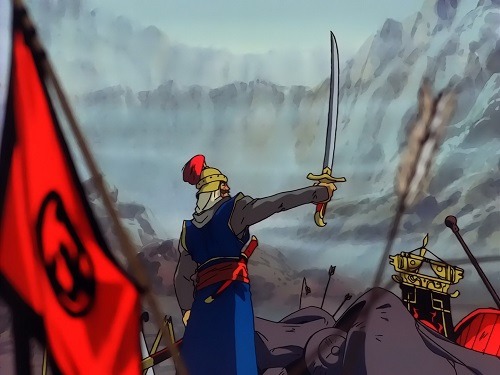
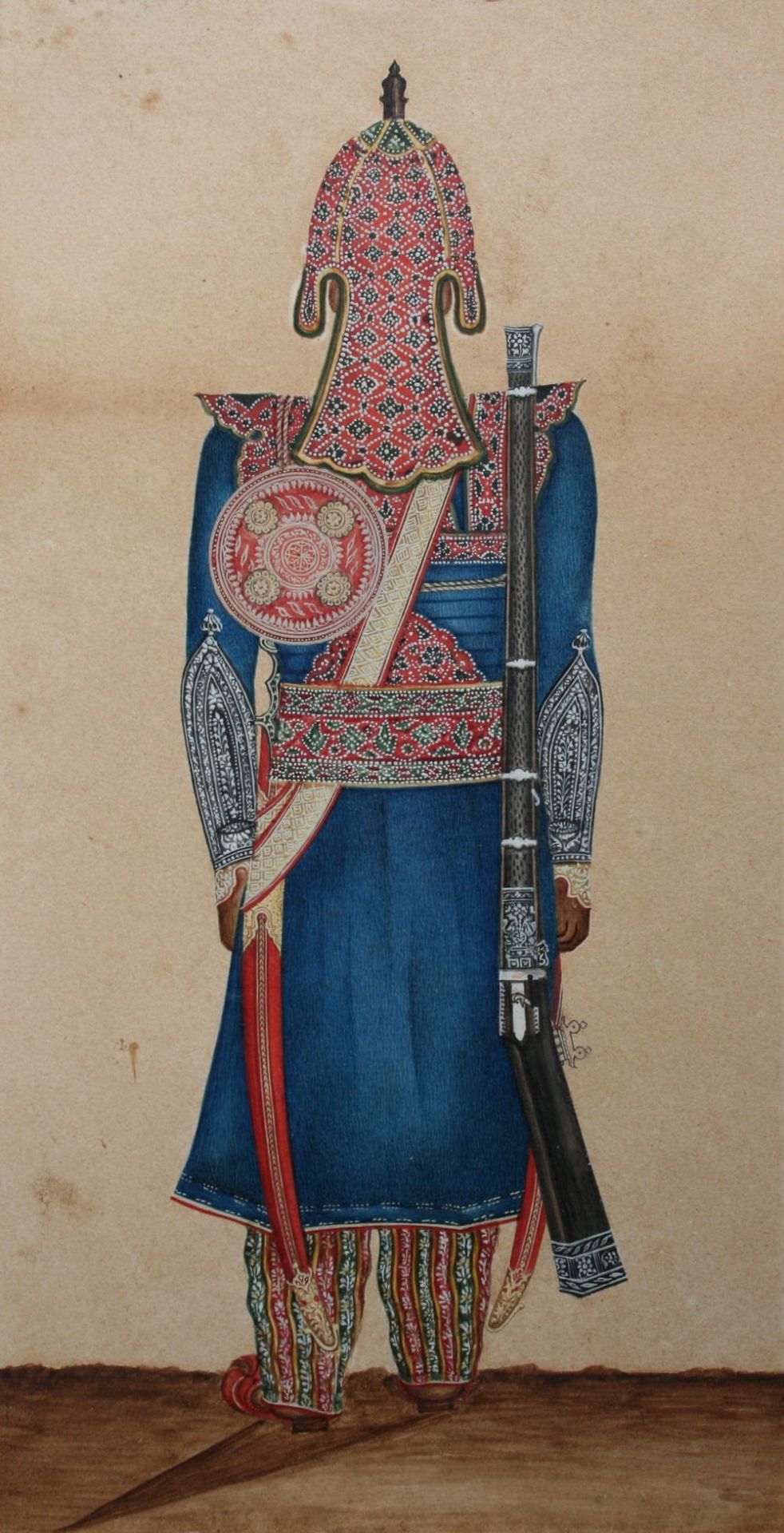
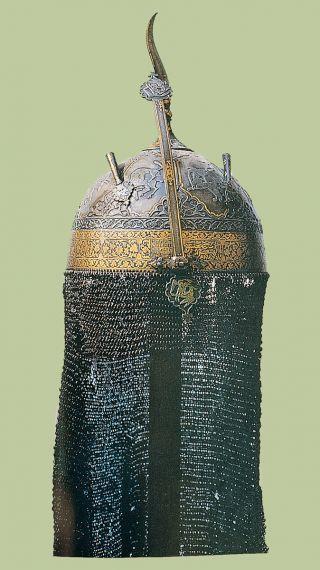
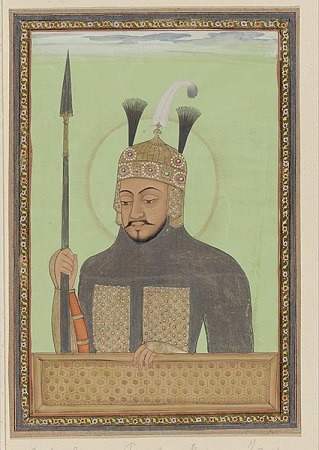
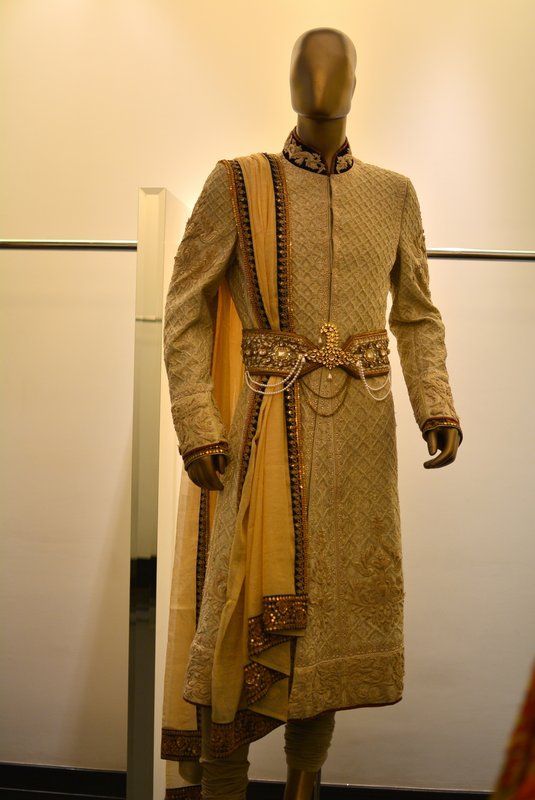
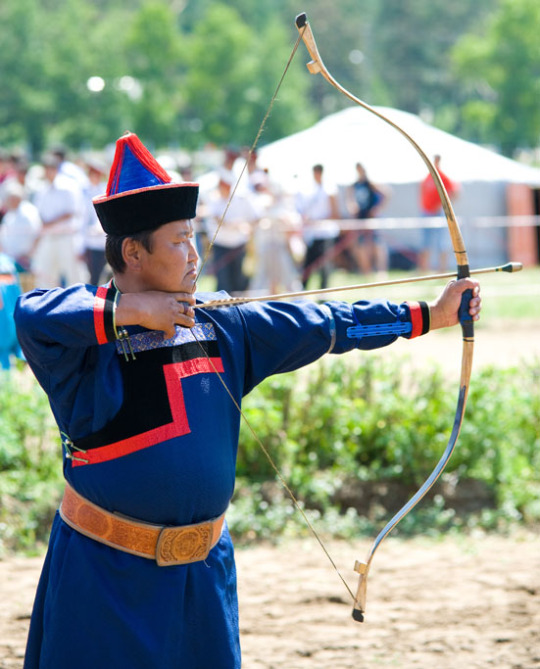
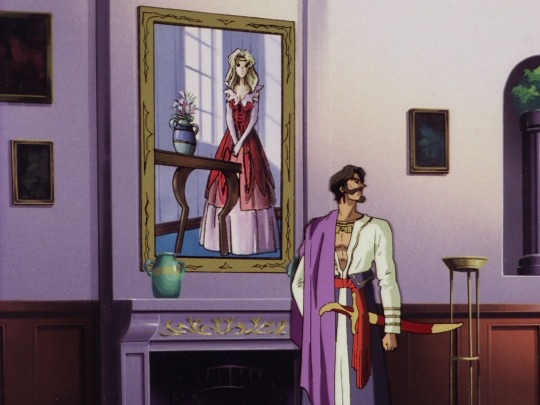
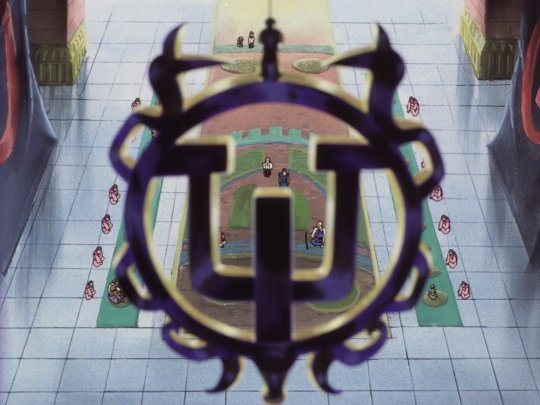
amazing cinematography. this whole scene is very economical labour-wise, but the shots don't feel that way at all. they made enough clever, striking decisions in the imagery that it feels as natural, believable as any other.
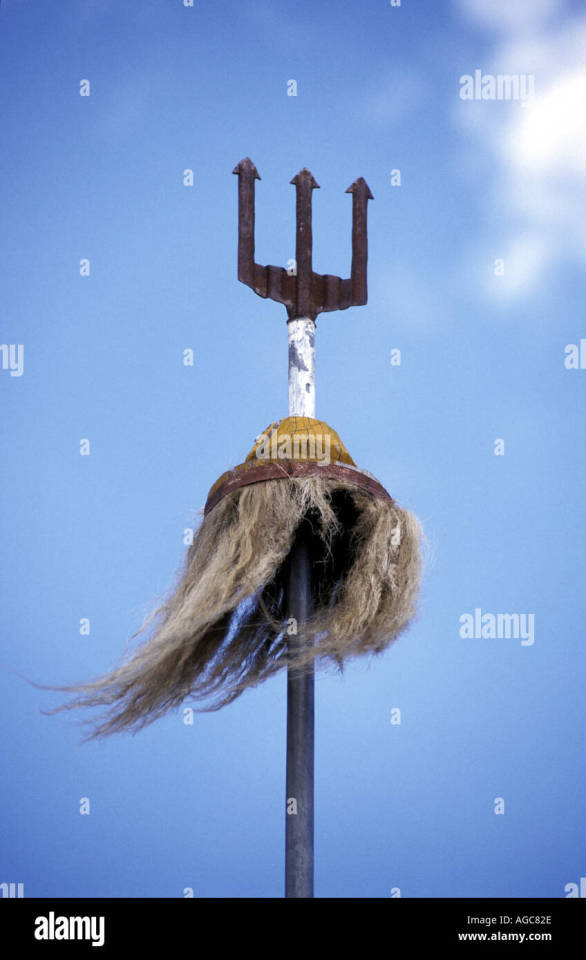
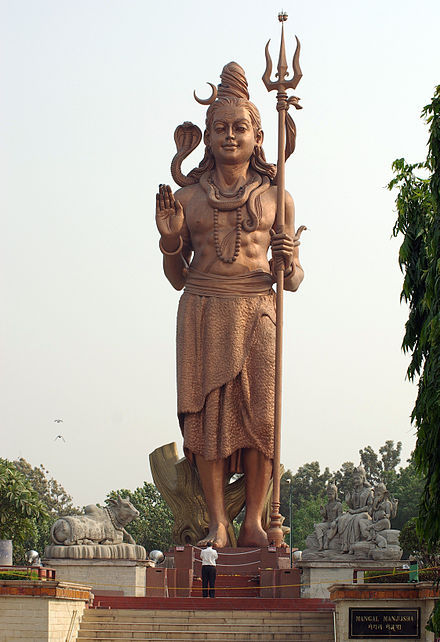
my man genghis' trident and shiva's trishul
has anyone heard of aenon? it was a place of baptism. aenon is a hellenised (ancient greek) version of the semitic term for "spring" or "natural fountain", ayn, which is also a prefix used to denote places where water can be found.
the duke's mech is named chafaris, or spelled chafariz, a portuguese word meaning fountain, which comes from the arabic ṣihrīj, meaning water tank or cistern. the first ever arabic dictionary, "Kitāb al-ʿAyn " or "The Source" is using a specific definition of ayn— "a water source in the desert" ⛲
i've said it before and i'll say it again, escaflowne is a merging of eastern and western concepts and ideas following the silk road and the history of various occupations in the region; it is not as simple as "well it's europe with some japanese flair," at all. it's inspired by nepal and tibet, and because it's inspired by nepal and tibet, that includes the rich history of the place. mecha series are almost innately political. if you want to focus on portuguese, here: spanish, portuguese, and italian all took major contributions of art, architecture, and vocabulary from arabic, and all these europeans had an invasive presence in MENA and asia. the muslims of iberia were in portugal until the 1200s. muslim spain lasted from the 700s to 1492, the toledo school was established to translate from arabic into latin. mughal/timurid empire was from the 1500s to the 1800s. portuguese india was from the 1500s to the 1960s. basra (... basram?), a port city of iran, was under portuguese control from the 1500s to 1600s. hm... maybe we can kinda ballpark some things from this :^)
wait i've just translated a section from an artbook

so it turns out i didn't NEED to do all this mental math myself, but hey ✌🏻😎
oh by the way! do theeeeese shapes look familiar to anyone?
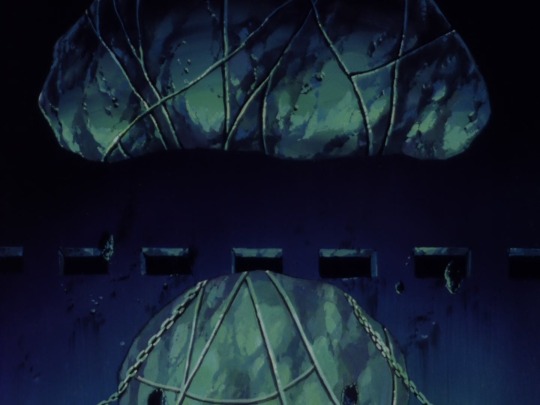
no...? how about... this:
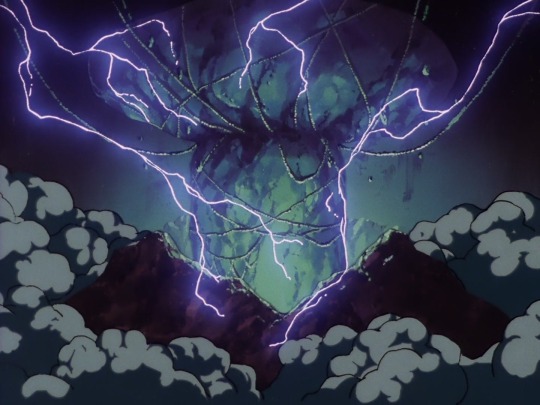
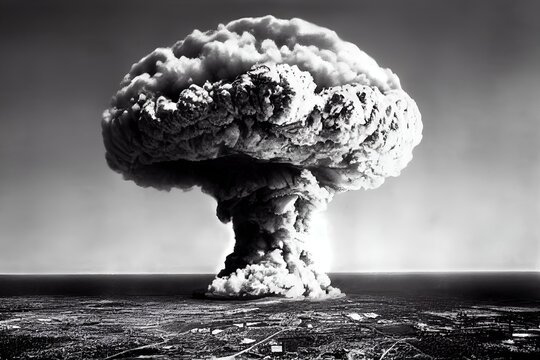
uh oh!
30 notes
·
View notes
Text
India's ports play a vital role in global trade, with 13 major seaports facilitating 95% of the country's trade by volume. Discover key ports like Mumbai, JNPT, and Mundra, and learn how these maritime hubs drive India's economic growth.
#major ports in India#ports in India#India sea ports#largest ports in India#imports and exports of India#major export ports in india
0 notes
Text
I made a discovery/theory that I thought I might share in case it's of use or interest to anyone else!
How big is Valisthea?
TL;DR - It's just Scotland, Cymru (Wales), Ireland, and England but flipped upside-down and photo bashed a bit.
These are just purely my observations, so I'm throwing them into the void!
So, for fan fiction purposes (and just general peace of mind), I really wanted to figure out exactly how big the twins were, considering how insanely quick everyone moves around. This is obviously true for video games in general but I felt it a lot more in FFXVI than other comparable games imo.
There's not a ton to go off of, just some throwaway dialogue lines here and there that give you the general sense that you can move from one location to the next in a day or two primarily by foot (chocobos are a whole other side tangent, as is the Enterprise or whatever the hell Dominants are capable of).
Some of those specific references include;
The trip from Rosalith to Pheonix Gate and back taking an expected 5 days total (with Clive, Tyler, and Wade arriving that night despite the detour through the marshes),
The boat ride from Port Isolde to Drake's Breath taking 3 days,
Someone from the hideaway referencing that they leave for Lostwing each day for work. (Couldn't find the exact example don't quote me on that one.)
Twinsides/Origin being "Hundreds of Leagues" away from The Hideaway
There's probably a few others, but most of the other examples I could find were open to interpretation, merely implying that travel took place in the same day but could be interpreted to have been spread out over longer were it not for 'video game logic and scale'.
That being said, I like things being a little more grounded for head canon purposes and wanted to know how much down time was reasonable in and between trips back and forth.
In general, I feel like the game should have been spread out over the full 5 years. But understanding game development limits, I get why that'd have been a nightmare! So the time skip makes sense practically, and I just choose to headcanon that events are a little more spread out. (Like them taking the full year in 873, from Clive and Jills rescue to destroying Drakes Head, rather than a couple of weeks like it seems in game.)
Shout out to this reddit post for doing an awesome estimate based on an average measure of the aforementioned "hundreds of leagues" quote. This was my starting point.
They concluded that Valisthea was likely closer in size to India or Australia, which I like a lot in terms of Valisthea being a full-scale continent. However, it does mess with the timeline a lot.
Also, I'm from a large country so my sense of what is a "reasonable" distance is pretty thrown off compared to a lot of other places. A 2-5 hour (200-400km) car ride to another city is nothing in my head until you realize that distance would take 1-4 weeks to walk or even ride (Horse metrics. Again chocobos are weird and probably a bit faster due to being all terrain and more robust than horses but are also birds so I don't know what endurance levels carrying heavy loads would be like).
Soooo, I began looking for European contemporaries since the game is very eurocentric (and all the criticisms that come with that).
Which led me to the realization that Valisthea is literally just the UK and Ireland, but flipped.
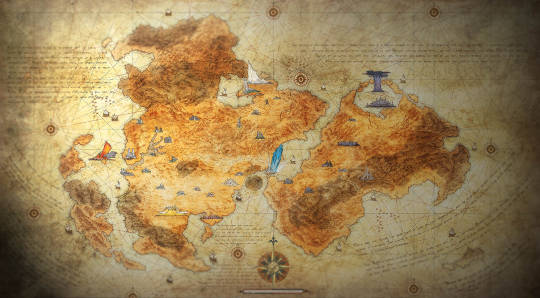
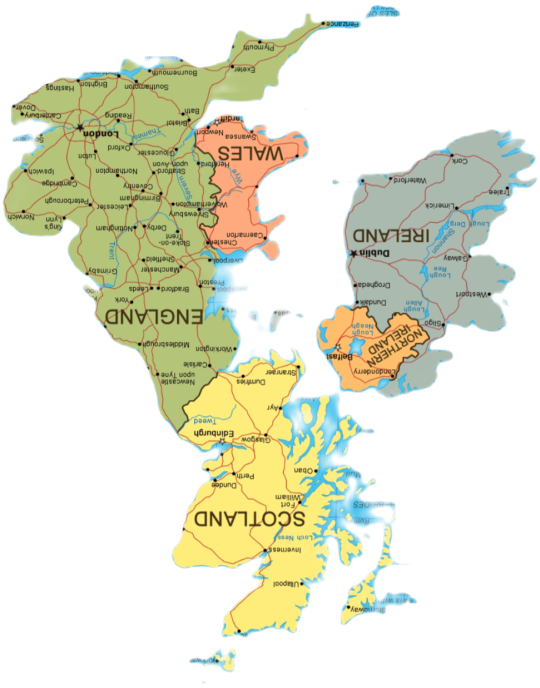
Now. Am I 100% certain this is what the devs did? Of course not. Is it so damn close that I'm 99.9% certain? Yes. Storm is Britain, and Cymru. The Northern Kingdom and the Iron Kingdom are Scotland but broken up. And Ash is Ireland and Northern Ireland.
Major cities or points of interest all have approximate real-world contemporaries and even follow geographical features on the map in that there are matching rivers, topography and even highways.
The biggest giveaway to me was Pheonix Gate just literally being London, as well as Norvant Valley matching exactly in shape with an upside down Bristol Channel (which would put Caer Norvent in Swansea). Even The Greatwood lines up relative to a major national park (forgive me UK peeps, it's hard to tell from a map alone if that's all one giant forest or several parks smooshed together).
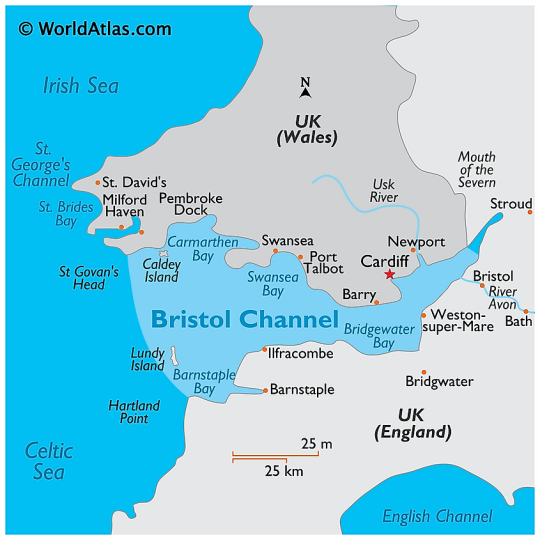
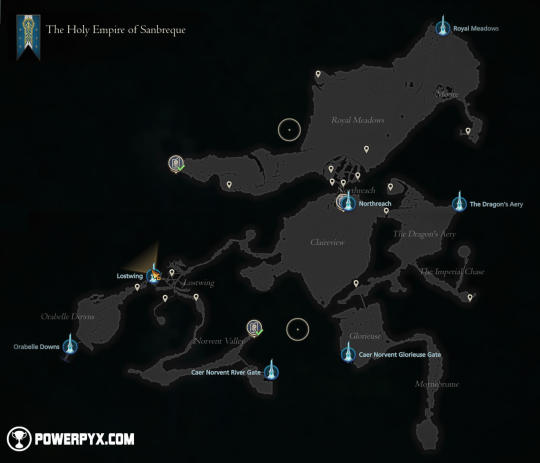
So, if we're working off that assessment, with the quote from Tomes where he mentions that Valisthea is a small continent, then the time/distance ratio makes a lot more sense!
Of course, by our world standards – the UK alone does not a continent make.
But I'm honestly ok with that? I'd rather the land mass be small to match the timeline rather than warp the timeline to match the land mass.
So, here's a list of some of my estimated real-world contemporaries for all major landmarks on the Valisthean Map. Of course, they don't line up 1-1, and are not at all reflective of the locations themselves. It's all just for a relative sense of scale.
Rosaria;
Martha's Rest - Oxford
Eastpool - Reading
Pheonix Gate - London
Rosalith - Cambridge
Port Isolde - Peterborough (ignoring that it's not on the coast)
Deadlands
Cid's Hideaway - Stratford-Upon-Avon
Clive's Hideaway - Birmingham
Sanbreque;
Lostwing - Tauton
Caer Norvent - Swansea
Northreach - Exeter
Oriflamme - Kingsbridge
Kingsfall - Salisbury
Dhalmekian Republic;
Kostnice - Leicester
Drake's Fang - Sheffield
Dhalamil - Derby
Dravozd - Wolverhampton
Tabor - Shrewsbury
Boklad - Lampeter
Ran'Dallah- Tregaron
Waloed;
Shadow Coast - Belfast
Eistla - Kinnegad
Edge of Infinity - Westport
Ravenwit Walls - Wenagh
Stonhyrr - Cork
Other;
Twinsides - Fishguard
Kanvar - Chester
Drake's Breath - Ipswich
Dzemekys - Aberystwyth
Going off of those locations, I was able to get the rough time/distance of certain trips (using google maps metrics in pure walking hours not how long it took them because of *variables*)
Routes;
Rosalith to Pheonix Gate: 86km, 20hrs
Hideaway to Pheonix Gate: 172km, 39hrs (to Martha's Rest: 67km, 15hrs; +Eastpool: 41km, 9hrs; then to Pheonix Gate: 64km, 15hrs)
Hideaway to Oriflamme: 295km, 68hrs (Hideaway to Lostwing: 184km, 43hrs. What shortcut Cid?? +Northreach: 48km, 11hrs; +Oriflamme: 63km, 14hrs)
Lostwing to Caer Norvent: 199km, 46hrs (Benedika and Co were at that fort for days, not hours. Also, how hard did Cid knock Clive out if it took more than a week to get back to the Hideaway after the Garuda Fight?)
Shadow Coast to Stonhyrr: 755km, 171hrs. (Shadow Coast to Eistla: 169km, 38hrs; +Edge of Infinity and back: 181km, 41hrs x2; +Stonhyrr: 224km, 51hrs) meaning crew were gone in Waleod for WEEKS.)
So, all in all a bit longer than in seems in game but still well within range given that they probably shaved off arbitrary travel days for narrative flow.
That being said, I love the potential of more "down time" moments. And it really shows just how often/long everyone would be gone from the Hideaway at any given moment.
It puts into perspective Gav's side quest, "You keep sending me wherever you need to, I'll keep going. Safe in the knowledge that I'll have a home to come back to." And how they all remark that they never seen each other, or how much their trips away together were really meaningful.
(Also kinda excuses the fact it took Clive and Jill 5 freaking years to get together. They were too busy walking everywhere!)
Is it possible to just pop down to Martha's for a quick supply run? Yes. But unless you're on a chocobo, you're camping out at Three Reeds then staying the night at the Inn before heading back. It's more of a 4-7 day trip rather than an afternoon and back.
Anyhow, I hope this all makes sense!
Now, time to go write about Clive/Cid camping overnight in the Greatwood together on Clive's first real night of freedom. 😭😭😭
34 notes
·
View notes
Text
i’ve recently come across an insightful video analysis that was reposted on tiktok, explaining the Gaza situation in depth and touching on the geopolitical and economic motivations that background it, along with the potential impact from the ethnic cleansing and the active genocide of Palestinian people by zionists. here’s a summary with some links to more-reputable news articles:
-roughly around a month ago, netanyahu declared his plan for a “new middle east,” an economic corridor stretching from India to the European continent, through the UAE, Jordan, Saudi Arabia, and “israel.”
-due to the weakening of the US Dollar, this “new middle east” corridor serves as a hopeful (on their part) counter to China’s new ongoing “silk road.” it’s essentially a move for leverage on world economics, trade, and politics.
-Russia is the country with the largest proven reserves of natural gas. in 2022, Nord Stream 1 and 2 (Russia’s gas pipelines) were both blown up. sanction packages from EU ban Russian gas. no more Russian gas coming into Europe.
-Iran, the country with the second largest gas reserves, signs the Nuclear Deal in 2015-2016. the US backs out of the deal and reimpose harsh sanctions on Iran. Iran is barred from selling its gas and oil to Europe and others.
-with Russia and Iran out of the picture, “israel” (US-backed) proposes itself as a solution to EU’s gas shortages. in 2010, they find the Leviathan—a giant gas field in the middle east (Mediterranean Sea), off the coast of Palestine, Lebanon, and Syria.
-Syria initially declines offers over its gas reserves; the US now controls 1/3 of Syria and all its oil fields, and “israel” regularly bombs it’s most vital port (Latakia). another major port is in Beirut, which mysteriously exploded in 2020. both Syria and Lebanon’s maritime activity are limited, including in trade and gas exploration.
-Gaza, also having its own unexplored gas fields, has been under siege, under naval blockade since 2007. the only working port left in the coast is haifa port in “israel.” “israel” is now the only one able to explore gas and implement an economic corridor, like the proposed “new middle east.” what the US and “israel” have essentially done is killed off the competition, stole their goods, and cornered the market.
-in light of Europe’s gas shortages, to get them gas before winter, “israel” attempts to “stabilize��� the region by solving “the Palestinian question”—more than displacement, they’ve resorted to ethnic cleansing and genocide. basically an acceleration of their plan.
-what Palestinian resistance groups have done in response was because they were backed into a corner. tooth and nail, life or death. it did not happen in a vacuum.
it has always been a move for natural resources; Palestine, Syria, Congo—every move for destabilization framed as intervention. it has always been greed for capital.
update:
it’s come to my attention that the video in question might have some more pro-Russian leaning stances, and so i’ve deleted the google drive link to the reposted tiktok and the link to the actual tiktok as i do not wish to platform the denial, partial or in whole, of the atrocities done to Ukrainian people. i will keep the summary up with some parts omitted because i still do think it is an insightful analysis in general and i do think the knowledge is still useful and relevant.
#peace is not the answer; liberation is the answer#resources#palestine#free palestine#free gaza#gaza strip#please look into other resources within the first and second tags in this post too
79 notes
·
View notes
Text
One Hell of a Love (Book 1) Chapter Thirteen
Sebastian Michaelis x Demon! Reader
Chapter Thirteen: One Hell of a Prince
Summary: Sebastian, (Y/N), and Ciel find a strange prince and his khansama in London.
“Have you still not apprehended the culprit, Abberline?!” cried Lord Randall as (Y/N), Sebastian, and Ciel walked up to another crime scene of an Englishman being hung upside down naked in the street.
“I-I am profoundly sorry, sir!” said Abberline.
“Failing to catch Jack the Ripper, doing nothing but putting feathers in that brat’s cap…” Randall huffed.
“That brat? Do you mean Ciel Phantomhive?” said Abberline as he looked over case files. “I cannot help but feel he bears some immense burden even though his is still but a child.”
“A child?” remarked Ciel, leaning over to see Abberline’s files without announcing himself. “A series of incidents targeting those who have returned from India?”
“Master Ciel!” exclaimed Abberline.
“It seems there haven’t been any fatalities yet,” said Ciel. He stepped up and took another paper from Randall’s hands. “ ‘Crazy and lazy children, huh?’ ” He read from the statement of the perpetrator. “The culprit’s choice of words is very accurate. I also think this country would be considerably better off without the nouveau riche who cam back from India. At any rate, this mark is…”
“They’re making fun of us and Her Majesty the Queen!” declared Randall. “The culprit has to be Indian.”
“Ah, so that’s why I was called out,” said Ciel. “The vast majority of Indians who have been smuggled into the country are situated in the East End underworld society. Scotland Yard still has no idea of the exact number or their precise location, does it? There is no way we can sit idly by while the royal family is slandered. Let’s go, Sebastian, (Y/N).”
The small group walked along the port to where many suspects might live. As they walked, a man bumped into Ciel.
“Oh, so painful!” cried the man dramatically as more men surrounded them. “I think one of my ribs has fractured! Damn it, I might die!”
“This is terrible,” cried another man. “You should get compensation to pay for a doctor!”
“You better leave us everything you have,” said another voice in the crowd.
“We seem to have been surrounded by rather loutish thugs,” remarked Sebastian.
“So unfortunate. We should clear the way,” said (Y/N).
“Take care of this quickly,” said Ciel.
“Understood,” said Sebastian.
“Hey!” The man grabbed Ciel by the collar. “All the Indians around here have a grudge against you English!”
Which is fair, all things considered, thought (Y/N).
The man raised a dagger, and Sebastian flicked him in the forehead. The simple motion threw the man to the ground.
“Are you alright?” asked Sebastian with a smile.
“Yes,” said Ciel.
“You bastard,” growled the man. He raised his dagger again.
“Wait,” said a new voice. Everyone paused as a two well-dressed men, one with purple hair and the other with white, stepped out onto the street. One held a really terrible drawing. “We are looking for someone. Have you seen this person?”
“What do you want, you bastard?! Don’t interrupt me!” said the thug.
“Are you having a duel or something?” said the new man brightly. He blinked as he saw (Y/N) and Sebastian beside Ciel. “Oh, he has a khansama with him. Are you one of the English nobles?”
“And if I am?” said Ciel coldly.
“In that case, I shall side with my countrymen in this quarrel,” said the young man. He turned to the man following him, the white-haired one, and said, “Agni.”
“Yes?” said Agni.
“Defeat them,” said the man.
“Jo anja,” said Agni dutifully. He began to unwrap his bandaged right hand. “My right hand, blessed by the Gods, shall be wielded for my master.”
Agni ran at them. Sebastian grabbed Ciel and jumped out of the way, and (Y/N) blocked Agni’s attack, their eyes narrowing as Agni’s inhuman strength, yet he was as human as anyone. Agni adjusted quickly, turning midair, kicking, flipping, and striking with blows faster than the human eye could be. (Y/N)’s reactions were catlike with precision, perfectly timed with his attacks.
“I’ve hit your vital points several times now,” said Agni. “You should already be paralyzed. How can you still move?” (Y/N) smirked at his confusion.
“Hey! We were just passing through here!” said Ciel. “It was those men who looked to rob me.”
“What? You people, did you attack the little one over there for no reason?” asked the purple-haired noble. “That is not right! This time, my countrymen are at fault. Agni, take the little one’s side.”
That’s how easy it is to change is mind? (Y/N) raised an unimpressed eyebrow.
“Understood,” said Agni, and in a moment, all the men were lying in a heap on the ground. “It’s taken care of, Prince Soma.”
“Good,” said Soma. “Well, then, I was in the middle of looking for someone, so I had better be going. See you.” He sighed and turned away with Agni. “English roads are too complicated. Let’s head left next.” And they just…walked away.
What strange humans, thought (Y/N).
l
“I’m completely drained,” muttered Ciel once they made it back to the townhouse. “The culprit might have been one of those we saw.”
“Let us await Lord Randall’s report,” said Sebastian.
“Young Master, welcome home,” greeted the rest of the servants.
“If I keep getting called out to London for all these trivial incidents, there’ll be no end to it,” huffed Ciel.
“Ah! Earl, you really did come!” Lau opened the front door, not caring for decorum or invitations as usual.
“You’re always so unannounced!” said Ciel. “I keep telling you, if you’re going to visit, at least send a letter or something first.”
“Have you said that?” Lau’s memory was terrible as always.
“Since we have a guest now, I shall prepare some tea,” said Sebastian.
“Fine,” said Ciel.
“I’d prefer an English Chai blend,” said a familiar voice.
“Fi—!” Ciel’s eyes widened as he saw Soma and Agni standing in the doorway.
“Ah, I met them around the corner,” said Lau. “They said they wanted to meet the Earl.”
“Why are you here?!” cried Ciel.
“Why? We got acquainted earlier, did we not?” said Soma.
“Acquainted?” questioned Ciel.
“And, also, we saved you,” said Soma, walking confidently into the house.
“Saved?! In what way?!” cried Ciel.
“In India, hosting for those to whom you are indebted is common sense,” said Soma. “Is it the English way to throw such people out under the cold sky?” He walked upstairs casually to a bedroom.
“Who are you anyway?!” demanded Ciel as he threw the door open after Soma and Agni.
“Me?” Soma was lounging happily on the bed. “I am a prince.”
“A prince?” asked (Y/N). The rest of the servants peeked into the room next to them.
“This personage is the Bengal Kingdom’s prince, the twenty-sixth son of the King of Bengal, Prince Soma Asman Cadart,” said Agni.
“I’ll be imposing on you for a while, Little One,” said Soma.
Presumptuous. He’s going to be an irritating guest, thought (Y/N).
“Wow! A prince!” exclaimed Finny.
“A prince!” echoed Mey-Rin.
“This is the first time I’ve seen a real prince in the flesh!” said Baldroy.
“You may approach me,” said Soma. The servants crowded Soma with questions.
“So, you brought your servants with you this time?” remarked Lau.
“Yes. We have a guard dog to protect the manor while we’re away now,” said Sebastian.
“Well, that must be a relief,” said Lau.
“Sebastian, (Y/N), keep an eye on them,” said Ciel.
“Understood,” said Sebastian.
“Yes, sir,” said (Y/N).
l
“Master Ciel, it is time to wake up.”
Ciel’s eyes opened before jumping in shock. Agni and Soma were in his room.
“Namaste, Master Ciel,” said Agni, smiling.
“Why are you in my bedroom?!” cried Ciel.
“We’re going out, Little One! Show us around!” said Soma brightly, picking up Ciel.
“Why should I have to?!” demanded Ciel, trying to push out of Soma’s arms. “And I have a proper name! It’s Ciel, not Little One!”
“Then, Ciel, I ask that you be our guide,” said Soma. “Come!”
“Sorry to intrude,” said Sebastian, stepping into the room before Soma could run away with Ciel. “But the Young Master has studies and work duties to attend to today to today.”
“You’ll have to accompany yourselves,” said (Y/N), smiling.
“No, we shall stay and wait for Ciel,” said Soma, smiling as if that was normal.
(Y/N)’s nose twitched in annoyance.
l
Sure enough, Soma and Agni were not far behind Ciel as he practiced violin. (Y/N) watched in amusement as Sebastian, in a tutor outfit (which made (Y/N)’s eyes unabashedly roam him), instructed him.
Ciel played as best he could, and Sebastian listened for imperfections. The melody was interrupted, however, when the sound of prayers began. Agni and Soma had erected a statue of a Hindu goddess and were praying before it.
“What on earth?” asked Ciel.
“It seems they’re praying, but that’s a rather fantastic idol, isn’t it?” remarked Lau.
“I’ve seen Cults. This is reasonable for hu-people,” said (Y/N).
“All I can see is a statue of a woman carrying a head with a necklace of heads around her neck, dancing on the body of a man,” said Sebastian.
“She is one of the Hindu gods we worship, the Goddess Kali,” said Agni.
“Hindi gods, eh?” said Ciel.
“Kali is the wife of Shiva and a goddess of power,” explained Agni. “In far distant times, a certain demon recklessly challenged her to a fight. Of course, the goddess Kali won. However, after that, unable to quell her destructive urges, she went on a rampage of death and destruction. In a bid to defend the Earth, her husband, the god Shiva, lay down at her feet. Having stepped on her husband with unclean feet, the goddess Kali returned to her senses, and the Earth once again became peaceful. Kali is the great goddess who defeated a demon after a mighty battle. As proof of that, she has the demon’s head in her grasp.”
“So he says,” said Ciel, glancing back at (Y/N) and Sebastian.
“To think there was a god as strong as that…” murmured Sebastian. “I will have to be careful if I ever go to India.”
“I rather liked Egypt when I traveled there,” said (Y/N). They smirked. “I convinced some people to worship me.”
“Well, then, our prayers are concluded, so let’s go out!” said Soma.
“As I said, I’m busy!” said Ciel as Soma tried to drag him out again.
“What are you even doing anyway?” sighed Soma.
“You’re being distracting. Be quiet!” said Ciel. He picked up his fencing sword. He had practiced violin, now it was fencing. “If you want my attention so badly, then I’ll be your opponent!”
Soma excitedly took the other sword. “So, if I win against you, you’ll come out with us?”
“If you can,” said Ciel.
“Good luck,” said Agni.
“Well, then, begin!” said Sebastian.
Agni is going to be beaten, thought (Y/N). He clearly has no idea what he’s doing.
Sure enough, Agni swung the foil at Ciel’s leg, and it bent.
“There’s no benefit to hitting the foot with a foil,” remarked Ciel sarcastically.
Agni parried a few blows and huffed. “That’s unfair! I don’t know the rules!”
“A match is a match,” said Ciel. “It’s your fault for not knowing.” Ciel had the upper hand and was about to finish the match with a blow to the stomach.
“My Prince, look out!” Agni intervened. One hand held a cup to block the tip of the fencing foil, and the other struck Ciel’s pressure points, causing his arm to go limp. Agni’s eyes widened as he realized what he’d done. “M-Master Ciel. I’m so sorry. When I thought that His Highness was going to lose, my body moved of its own accord.”
(Y/N) raised an eyebrow. Agni seemed to have some honor, even if Soma seemed immature and naïve. They would remain careful around the unnaturally talented human, but they had to admit, he wasn’t the most intolerable mortal they’d met.
Sebastian noticed (Y/N) observing Agni, and his eyes narrowed.
Soma laughed. “Agni, you protected me well. I give you my praise! Agni is my khansama and belongs to me. Therefore, the win was mine.”
“Th-That’s ridiculous!” said Ciel.
“Oh, dear, Sebastian, it seems like the Young Master’s honor must be defended,” said (Y/N). They smirked and tossed Ciel’s fallen foil to Sebastian.
He caught it effortlessly. His eyes turned to Agni. Well, he had to prove a point now that the human had gotten (Y/N)’s attention. “Good grief,” he said. He masked himself easily with disdain at Ciel. “This happened because you teased an amateur who doesn’t know the rules.”
“My fault?!” huffed Ciel.
“Nevertheless, as a butler of the Phantomhives, now that my master has been injured, I cannot sit by and watch,” declared Sebastian. “All else aside, we’re ten minutes behind schedule.”
“So, that’s what you’re really irritated about,” muttered Ciel.
Not even close to correct, thought Sebastian.
“I will allow a duel,” said Soma. “Agni, in the name of Kali, do not lose!” Agni bowed and took the fencing foil.
“Sebastian, this is an order! Shut the brat up!” said Ciel.
“Make this entertaining, you two,” said (Y/N) brightly.
“Yes, of course,” said Sebastian, smirking.
“Jo, ajna,” said Agni.
“Begin,” said (Y/N).
Agni and Sebastian were instantly in motion. With each thrust and parry, they danced around one another. Both were perfectly matched for the duel with inhuman grace as they fought. (Y/N) watched in fascination. Agni was most definitely human, but his skills were equal to those of Sebastian at the moment. It was truly fascinating to wat
At the last moment, Agni and Sebastian both thrust their foil’s out, and the tips met. The foil’s bent. They snapped.
“Oh, my. The foils snapped,” observed Sebastian.
“The match is a draw,” said (Y/N), blinking in surprise.
“Ciel’s khansama is pretty good,” said Soma. “Agni is the best fighter in my palace. This is the first time I’ve seen anyone fight on par with him.”
Ciel walked to Sebastian and (Y/N) and whispered, “Just what is this man? He’s not one of those…” Reapers…
“No, he’s definitely a human,” said Sebastian.
“But with that power…He’s a likely suspect for the hangings,” said (Y/N).
Sebastian nodded. “Indeed. Hanging people would have been an easy task for him…” Perfect. (Y/N) would be wary around him instead of interested in any way.
l
It seemed that everyone else was having a positive reaction to Agni, as well. When Sebastian and (Y/N) stepped into the kitchen, they expected the usual chaos. Instead, Baldroy, Finny, and Mey-Rin were working well beside Agni.
“Thanks to everyone’s hard work, it looks like the food will be delicious,” said Agni.
“This can’t be real,” said (Y/N).
“Indeed, to have this lot helping you…” Sebastian didn’t have to elaborate.
“Everyone is born with their own talent,” said Agni. “They have a duty and path laid out for them by the gods. We children of the gods abide by that and do what we can.”
“You are a most well-rounded individual, aren’t you, Mr. Agni?” said Sebastian.
“Not at all. Until I met the prince, I was a hopeless fool,” admitted Agni. “I will be forever in his debt. I injured those around me, strayed from the gods, and accumulated many sins. Finally, my day of judgement came. Without leaving any attachment in this world, I would…have died. But Prince Soma gave me a new life. To me, who had not even believed in the gods, who had thrown everything away…A god appeared! Indeed, that day, I saw the holy light of God within the prince.”
(Y/N) raised an eyebrow. An interesting mortal.
“The prince is both my king and my god,” said Agni. “Therefore, I will use this new life to protect the one who gave it to me and grant as many of his wishes as I can.”
“Interesting,” said (Y/N), cocking their head. “You truly are devoted to him.” They had no loyalty to anyone in that. Well, almost anyone, but as a demon, they had to be ready to let go of attachments at any moment.
“Yes,” said Agni. He brightened for a moment. “Ah, and I wanted to say something to you, (Y/N).”
“Yes?” said (Y/N).
Agni bowed. “I apologize for fighting you when we first met. Had Prince Soma and I known our countrymen were at fault, I would not have attacked.”
(Y/N) raised an eyebrow. They put on a smile. “I am perfectly capable of defending myself against you, and you were following your prince’s orders as a servant should.”
Sebastian’s respect for Agni’s devotion to his master and pure humanity was quickly losing to his desire to throw the man out of the house.
Taglist:
@technikerin23
@im-making-an-effort
@izzieg3987
@jinxxangel13
@alexpangender
@otomyoli
@neenieweenie
@nex-crowley
@anxious-chick
@bellacastiel
@v1l-ismissing
@agentdedf1sh
#one hell of a love#x reader#x gn reader#gn reader#x nb reader#nb reader#demon reader#demon!reader#sebastian x demon!reader#sebastian x reader#black butler sebastian#sebastian michaelis#sebastian michaelis x reader#black butler x reader#black butler fic#black butler ciel#black butler#kuroshitsuji x reader#kuroshitsuji
109 notes
·
View notes
Text
In Israel, you’ll find a patchwork of different communities. Most Israeli Jews originate from Europe, North Africa and the Middle East, but some come from other regions, such as India.
According to the Indian Embassy in Tel Aviv, there are about 85,000 Jews of Indian origin in Israel — so Indian Jews make up just 1.2% of Israel’s Jewish population. This small community is divided into four groups: the Bene Israel from Maharashtra, the Cochin Jews from Kerala, the Baghdadi Jews from Kolkata, and the Bnei Menache from Mizoram and Manipur.
Although I grew up in the U.S., my mother’s family is from the Cochin Jewish community in Israel. I wanted to find out more about how this community is preserving our unique Jewish traditions from the South of India.
Many of these traditions are at a risk of dying out. For example, the language of the Cochin Jewish community is called Judeo-Malayalam. Today, this dialect has only a few dozen native speakers left (you can hear it spoken in this video).
According to legend, the first Jews arrived in Cochin during the time of King Solomon. The oldest physical evidence of their presence is a set of engraved copper plates dating from around 379-1000 CE, which were given to community leader Joseph Rabban by the Chera Perumal dynasty ruler of Kerala.
Jewish sailors originally arrived in Kodungallur (Cranganore), an ancient port city known as Shingly by Jews, before shifting to Cochin following a flood in 1341. These Jews became known as the Malabari Jewish community. After the expulsion of Jews from Spain in 1492, a group of Sephardic Jews also came to Cochin, and became known as the Paradesi (Foreign) Jews. The Malabari and Paradesi Jews historically lived separately and maintained their own traditions, although in modern times this division has become less important.
Today, the vast majority of Cochin Jews live in Israel. I spoke with several community members to learn about current projects in Israel to preserve Cochini Jewish culture.
Hadar Nehemya, a jazz musician and performer, runs a food delivery service sharing traditional Cochin Jewish recipes. Hadar learned the art of cooking from her mother, who learned it from her paternal grandmother.
Cooking her dishes from scratch and selling them at markets and for delivery, Hadar’s goal is to introduce Cochini cooking into the mainstream of Israeli culture. “Many Israelis don’t know much about Cochin Jewish culture. Maybe they met a Cochini person in the army,” she said. “But Indian food is popular in Israel, because Israelis love to visit India after they finish their army service.”
Cochin Jewish cuisine is similar to other types of South Indian cuisine, but also has influences from Iberian and Middle Eastern cooking. One example is pastel, pastries with a spicy filling that are similar to empanadas. Other staples include fish and egg curries, chicken stew, black-eyed pea stew, dosa (thin rice pancakes) and dishes cooked with coconut and mango.
Hadar’s favorite dishes to cook are idli and sambar, which are often eaten together. Idli is a type of savory rice cake, while sambar is a spiced lentil stew. Although Hadar says it’s difficult to maintain an Indian food business from an economic perspective, she’s passionate about cooking and enjoys creating homemade dishes with the right balance of spices.
Along with cooking, music is also important in Cochini culture. In most religious Jewish communities, women aren’t permitted to sing in front of men who aren’t their immediate relatives. However, this prohibition was not part of the Cochini tradition.
In the Cochin Jewish community, women have sung in Hebrew and Judeo-Malayalam for centuries. Piyyutim (liturgical poems) were sung in the synagogue or at people’s homes during holidays. Judeo-Malayalam folk songs were sung at weddings and special occasions, and the lyrics of these songs were recorded in notebooks to hand down to future generations. Later, many women also learned Zionist songs in preparation for moving to Israel. I have memories of my own grandmother singing these songs at home.
In recent years, audio recordings have been produced of Cochini songs, including a collection called “Mizmorim” (Psalms) featuring Hadar’s grandmother, Yekara Nehemya. Hadar then created her own version of one of the songs, “Yonati Ziv.”
Today, community leader Tova Aharon-Kastiel has organized a choir which meets once or twice a month at different locations. In the choir, Cochini and non-Cochini women, mostly aged 65-85, sing songs in Hebrew and Judeo-Malayalam. The older generation is eager for the younger generation to get involved, but since most younger Cochin Jews have a mixed background and are assimilated into mainstream Israeli culture, this is sometimes proving a challenge.
Still, many young Cochin Jews are eager to connect with their roots. The community maintains several Facebook groups, including one specifically geared towards the younger generation. The group description reads: “If you are a young Cochini, you surely know (at least partially) the wonderful heritage of our forefathers and mothers… the sad truth is that this heritage is currently on its way to pass from the world.”
Shlomo Gadot is the CEO of Inuitive, a semiconductor company, and is actively involved with Cochini community projects. His nephew, Ori, runs the Facebook group for the younger generation. Shlomo says events are regularly held at the Indian Embassy in Tel Aviv for young Cochinis. “Normally the embassy gives them their office in Tel Aviv, and they invite the young Cochini people to come there and do a trivia contest,” he said. “They do it twice a year, once at Hanukkah and once at Passover.”
According to Shlomo, the embassy also has initiatives to create connections between Indian and Israeli tech companies. “Sometimes they invite people to the ambassador’s house or office to see how they can create connections between Israeli and Indian companies,” he said. “They also have a program to bring young people to India to help them get to know India better.”
Anil Abraham is one of the few Cochin Jews with recent memories of life in India. Born in Jerusalem, his family returned to India when he was 8 years old, and he lived there until age 35 before migrating back to Israel. He says he found growing up Jewish in India difficult, but rewarding. “It was very difficult to move there from Israel and learn Malayalam,” he said. “But it was amazing to be part of the community and enjoy Cochini food prepared from scratch. We used to attend prayers in the Paradesi Synagogue, because right now there are fewer than 20 Jews in Kerala.”
Today, Anil runs tours of Kerala for the Cochin Jewish community and others. “The kids travel with their parents and grandparents to India,” he said. “That’s how our traditions are passed down.”
17 notes
·
View notes
Text
Genya's Favorite: Watermelons
After having written at least one Kimetsu Kitchen entry for every other official favorite food and then some, I could not leave out Genya’s favorite, watermelons! Since people read my blog for meta, I couldn’t leave it at just an art piece—

I shall not leave him alone. I have a mission to complete. There is more below the cut.
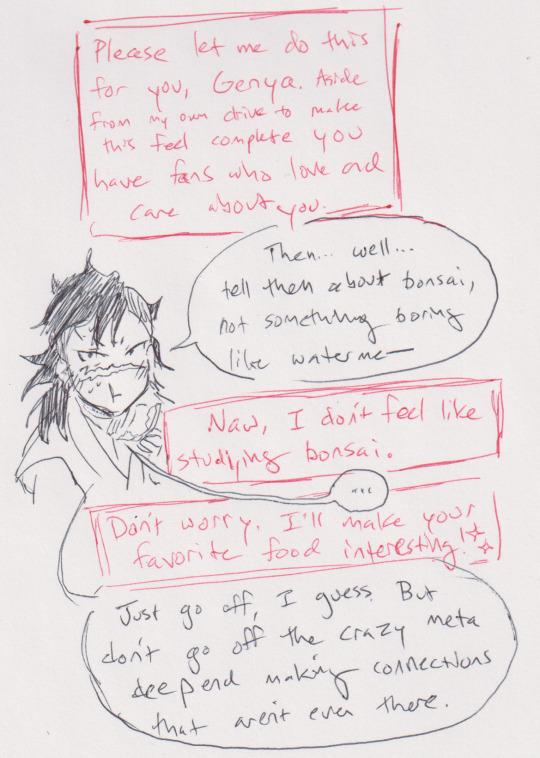
While the precise origins of human consumption of watermelon are not certain, they are thought to have been used at least 5000 years ago in the deserts of southern Africa. Originally, they’d have been quite bitter until they were later cultivated to bring out their sweetness. Actually, you can do all kinds of fun things with watermelon genetics to bring out all sorts of different attributes—
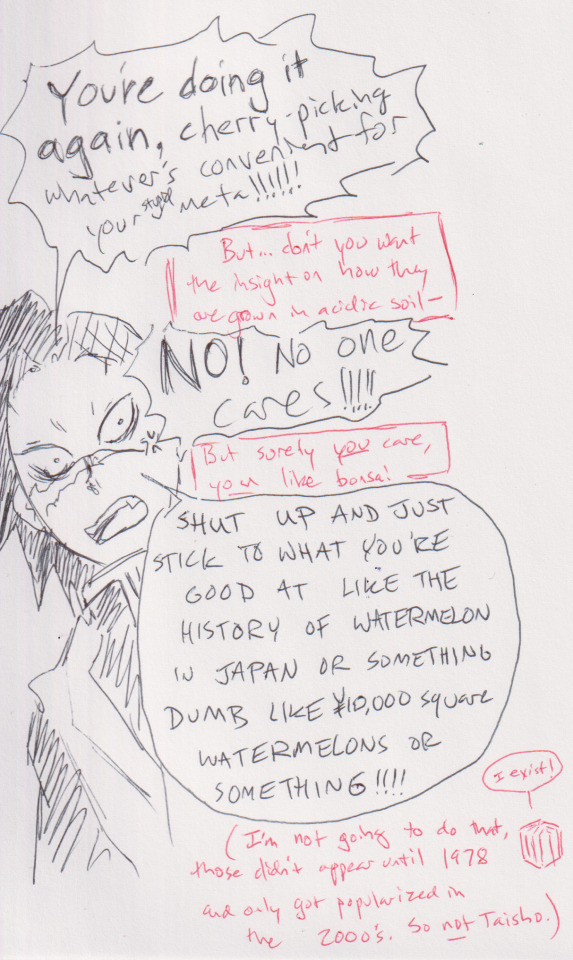
Alright, fine. It’s easy to find articles in English about the worldwide spread and development of watermelons, so I will focus specifically on their history in Japan, for the sake of KnY meta. Because that’s totally relevant. For sure. Totally.
The watermelon was likely cultivated in India by the 7th century, and then in China by the 10th century. The earliest possible record of watermelons existing in Japan can be found in the 12th or 13th century “Chojugiga” picture scrolls of caricatures of animals acting like humans. This a pretty ubiquitous series of satirical doodles often called Japan’s first manga, and academics have lot enjoyed deep-diving all the little scenes of animals dressing up like self-important monks or chasing after thieves. As you can see here, one of those panels has a rabbit carrying fruits, and among them, there are some round, striped fruits. It’s not entirely clear if these are watermelons or not, but there’s a pretty good case to be made for them having been brought over from China at some point in the Heian period.

Another possible early mention of them, by their modern name “suika,” can be found in some poetry written by a monk in the 14th century.
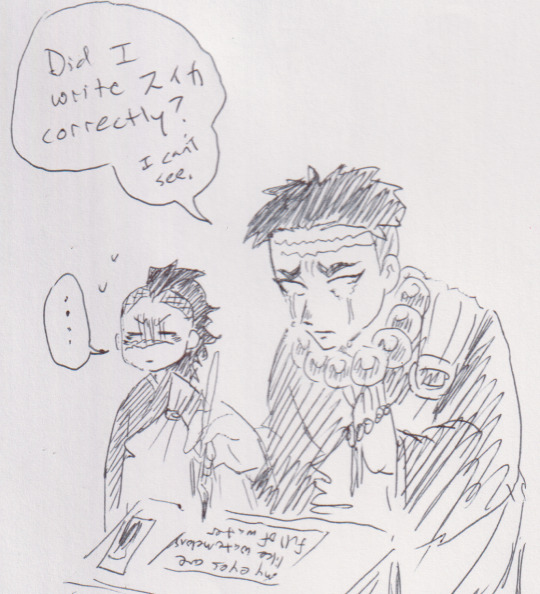
The first very specific mention we get of watermelons and their cultivation is in a 1696 text about farming records. It seems that at that time, they had both yellow and red varieties, and a long standing culture of raising watermelons already. By the time we get to 1702 records, we see watermelons being referred to by what was sort of like brand names, and then from the mid-Edo period on, there’s a whole lot more proliferation of brand-name varieties based on their rind, shape, color, etc., with certain areas of Japan being closely associated with the brand of fruit they produce. This is still a major element of fruit cultivation culture in Japan.
So, watermelons were already widely available to commoners (good news for a poor family like the Shinazugawas). The West started sailing into ports around Japan, and by the late Meiji period, this brought more American and Russia varieties of watermelons into the country. Throughout the Taisho period, Nara Prefecture in particular would go about as crazy developing new watermelon varieties as they do goldfish, but based on timing, my guess is that Genya wouldn’t had gotten exposure to a lot of the new Taisho varieties.
Thank you, I now feel satisfied having put watermelons into some KnY-relevant context.
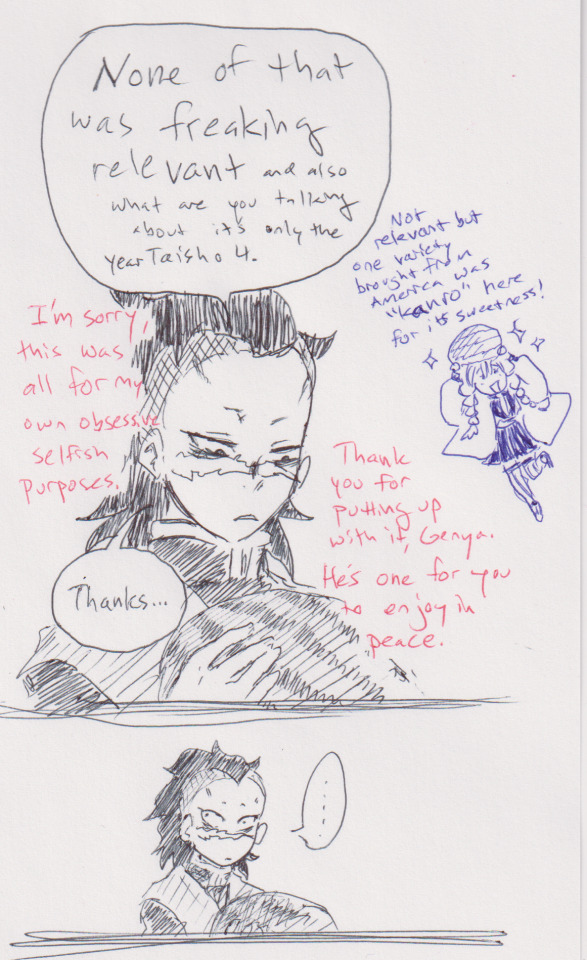

130 notes
·
View notes
Text
Lori Ann Larocco at CNBC:
Billions in trade came to a screeching halt at U.S. East Coast and Gulf Coast ports after members of the International Longshoremen’s Association (ILA) began walking off the job after 12:01 a.m. ET on October 1. The ILA is North America’s largest longshoremen’s union, with roughly 50,000 of its 85,000 members making good on the threat to strike at 14 major ports subject to a just-expired master contract with the United States Maritime Alliance (USMX), and picketing workers beginning to appear at ports. The union and port ownership group failed to reach agreement by midnight on a new contract in a protracted battle over wage increases and use of automation. In a last-ditch effort on Monday to avert a strike that will cause significant harm to the U.S. economy if it is lengthy — at least hundreds of millions of dollars a day at the largest ports like New York/New Jersey — the USMX offered a nearly 50% wage hike over six years, but that was rejected by the ILA, according to a source close to the negotiations. The port ownership group said it hoped the offer would lead to a resumption of collective bargaining.
The 14 ports where preparations for a strike have been underway are Boston, New York/New Jersey, Philadelphia, Wilmington, North Carolina, Baltimore, Norfolk, Charleston, Savannah, Jacksonville, Tampa, Miami, New Orleans, Mobile, and Houston. New York Governor Kathy Hochul said in a statement issued shortly after midnight that “the first large-scale eastern dockworker strike in 47 years began at ports from Maine to Texas, including at the Port Authority of New York and New Jersey. In preparation for this moment, New York has been working around the clock to ensure that our grocery stores and medical facilities have the essential products they need.” Rhetoric from ILA leadership has been aggressive in the weeks leading up to the strike, with ILA president Harold Daggett, who was a union member the last time it went out on strike in 1977, telling rank-and-file members — who unanimously voted to authorize a strike — in a recent video message, “We’ll crush them.”
[...] The most significant issues would be faced by food and automobile industries, Kamins said, as they rely especially heavily on the ports that will be shut down. While a surge in inflation is highly unlikely even with a longer strike, even a modest reacceleration could create uncertainty and force the Federal Reserve to be more cautious about lowering interest rates, which would weigh on the overall outlook for job growth and investment. A one-week strike could cost the U.S. economy $3.78 billion, according to an analysis by The Conference Board, and cause supply chain slowdowns through mid-November. In all, the ports threatened with strikes handle $3 trillion annually in U.S. annual international trade.
Many industries are preparing for major repercussions. Noushin Shamsili, CEO and president of Nuco Logistics, which specializes in pharmaceutical imports and exports, said the strike comes at a critical time for inventory replenishment for the pharma sector. “Almost all of this industry is just on time,” said Shamsili. “Raw materials are being brought in to complete drug manufacturing. Medical supplies for clinics and hospitals are on these vessels. For a while importers did not bring in a lot of cargo because they were overflowing with supplies post-Covid. Now they have started reordering medical devices, gloves, syringes, and tubing.” Shamsili also said the East Coast ports are a gateway for generic medicine made in India. Approximately 48% of the active pharmaceutical ingredients used in the U.S. are being imported from India. Without these APIs, medications cannot be produced. APIs are also manufactured in Europe, which also use the East Coast ports as U.S. points of entry.
[...] The Biden administration finds itself in a delicate political moment, with the presidential election one month away and President Biden vowing he will not use existing labor law to force union workers back on the job, which is within his powers under the Taft-Hartley Act. The Taft-Hartley Act, passed in 1947, was a revision of U.S. law governing labor relations and union activity that granted a U.S. president the power to suspend a strike for an 80-day “cooling off period” in cases where “national health or safety” are at risk.
Today begins the strike along East Coast and Gulf Coast ports after International Longshoremen’s Association (ILA) members walked off their jobs.
This strike, depending on how long it lasts, could have a major impact on the elections and the economy.
#2024 US Port Strike#Strikes#US Maritime Alliance#USMX#International Longshoremen's Association#ILA#US News#United States#Harold Daggett#Taft Hartley Act#Unions
7 notes
·
View notes